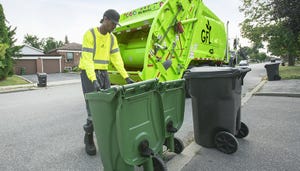Michigan's Border Patrol
September 1, 2003
Bill Sells
INTERSTATE SOLID WASTE transportation has been an ongoing issue for the waste industry for the past 25 years. States that import waste for disposal often complain that they are being dumped on, while ignoring their own refuse exports. The first interstate waste case heard by the Supreme Court was Philadelphia versus New Jersey, in which the Garden State wanted to keep out Philadelphia's trash. New Jersey lost and now leads the nation in the percentage of waste it exports.
However, New Jersey is not the target of the latest interference in the waste market. The flashpoint for the latest barrage of anti-waste, free-market legislation is Toronto, Canada's largest city. Because Michigan is the recipient of Toronto's trash, out-of-state trash has become a hot, local issue in the Great Lakes State.
Toronto is not like U.S. exporting states. It does not have members of Congress to argue its case and to ensure that the free trade guaranteed by the Commerce Clause is not being restricted. Instead, Canadians have several well-established trade agreements that make it difficult for the foes of free markets to prevail.
Michigan's efforts to block incoming Canadian waste shipments in 2003 have varied from the creative to the absurd. Arguing that Canadian waste was a national security issue, Michigan's U.S. Senators slipped language into a Homeland Security bill requiring installations of radiation detection equipment at the two most frequently used entry points for Toronto's waste. Then, when the severe acute respiratory syndrome (SARS) outbreak was raging in Toronto, Michigan politicians asked that Canadian trash be inspected for the SARS virus. They quickly retreated when a public health official from the University of Michigan said the SARS virus could not be transmitted through trash.
Unable to find a means to justify their end, Michigan officials resorted to more legislation. Bills were introduced in Congress to block Canadian waste shipments altogether. Another bill requires that the U.S. Environmental Protection Agency (EPA) Washington, D.C., be notified of and approve all Canadian waste shipments bound for America.
Unfortunately for Michigan politicians, their attempts to block Canadian waste shipments face several major obstacles. The North American Free Trade Agreement (NAFTA), the U.S.-Canada bilateral agreement on hazardous waste (amended to include solid waste), and the General Agreement on Tariffs and Trade (GATT) protect waste movement across international boundaries. During the July 23 congressional hearing on the bills, three trade experts testified that placing restrictions on Canadian waste would violate international agreements because Canadian waste would be treated differently than domestic waste generated outside of Michigan. One trade expert argued that although the legislation itself was not a NAFTA violation, any actions taken to restrict Canadian waste as a result of the legislation would likely violate NAFTA. Even the Michigan delegation was split on the legality of blocking Canadian waste shipments.
The EPA has stated more than once that the U.S.-Canada bilateral agreement is intended to facilitate, not prevent, cross-border waste shipments. The agency has noted that Michigan is a major exporter of hazardous waste to Canada, low-level radioactive waste to South Carolina and medical waste to Ohio.
Michigan politicians once claimed that Canadian waste did not meet Michigan's strict recycling standards, but their own inspections of Canadian trash showed that it was cleaner than Michigan's.
There's no doubt that Michigan will continue to search for ways to circumvent trade agreements, but the odds are not in its favor. Trade agreements are not entered into lightly; they are negotiated to promote trade, not restrict it. Trade agreements are a vital part of the international economy. If we close our borders to Canadian trash, the country is likely to close its borders to Michigan hazardous waste. And then, maybe those Michigan officials will have to go back and explain to their constituents why it's necessary to build a hazardous waste disposal site in their own district. Now that would be a profile in courage.
Bill Sells is the director of federal relations for the Environmental Industry Associations, Washington, D.C. E-mail the author at: [email protected].
You May Also Like


